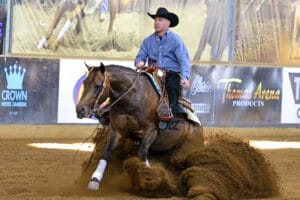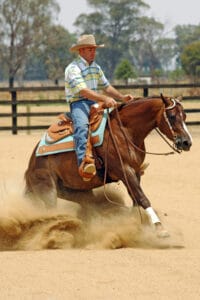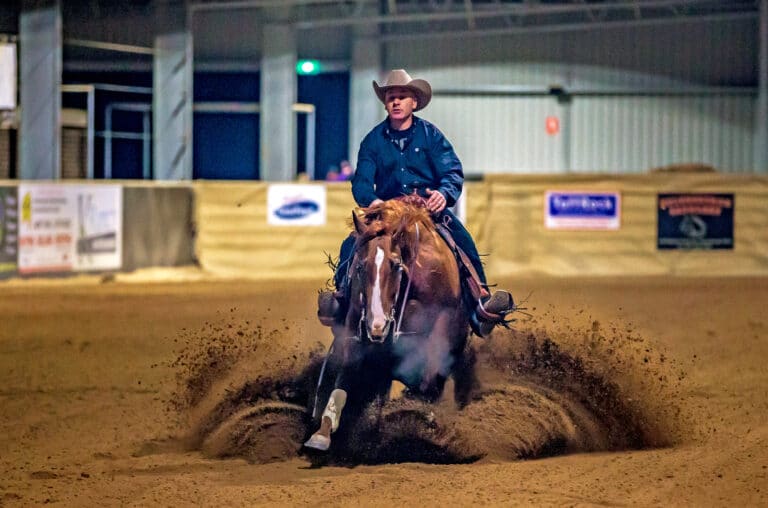One of Australia’s most successful reiners, Mick Taylor has multiple championships to his credit. He is also a professional horse trainer, and a mentor with the Equestrian Hub mentoring program.
Q: Do you come from a horsey background?
A: Sort of as my dad rode when he was young. My sister and brothers also did a lot of riding and Garry, one of my older brothers, showed horses way before I did.
Q: Where are you based?
A: At Nana Mai in Lemnos, Victoria. It’s an agistment and training facility owned by Darren and Cherrie Secomb.
Q: How old are you and is there anyone sharing your life?
A: I’m 52. At this stage there’s nobody special – I don’t have enough spare time!
Q: In the early days were you working with horses or did you have other employment?
A: I was self-employed, running a successful stainless steel installation business which allowed me a lot of freedom to explore and refine my training methods.
Q: When and why were you attracted to reining?
A: At 17 I rode some reined cow horses when the sport was fairly new here. The reined cow horse workout is in two parts: one’s a modified version of our reining pattern, referred to as ‘the dry work’, and then there’s the really exciting stuff of chasing a cow down the fence. Not much tops that feeling of sliding past the cow and turning the beast on the fence. I thought ARCHA, the Australian association, would kick off, but that didn’t happen until later so I changed over to Reining.
Q: Tell us about your mentor Martin Larcombe.
A: I started with Martin in 2001 when he and his wife Sam came home from Italy. I’d ride with him once a week, he was an inspiration. He has lived and worked in Switzerland and during the last ten years has been living in Whitesboro, Texas. He also has a property in Tatura here in Victoria. He’s now a NRHA Million Dollar Rider, an amazing effort. I owe so much to him for his patience and knowledge – he’s such a cool competitor under pressure.

Mick competing in the Michelle Halliwell Memorial Non Pro (Image by Ken Anderson Equine Photography).
Q: Explain the process of training a young, just broken horse to become a successful reiner.
A: Nowadays I have my two-year-olds started under saddle by people like Kath Kelderman, Shannon Elyce and Garry Brown. Usually that takes around 12 weeks then I’ll give them a month or so off. Then for three to four days a week I’ll ride them for around 20 minutes working on basic exercises. Within the first six months you have a good idea whether or not it’s worth continuing with them. Around the six month stage I begin expecting a little more from them up until they’re three, when I take them to a show to build their confidence and just ride around, and maybe even do a training class. Reining Australia has established a Four-Year-Old Futurity which allows us trainers to slowly establish a solid and confident horse that will be around for many years. Longevity is so important.
Q: If a horse fails as a competitor what other disciplines might be appropriate for them?
A: There’s western dressage, ranch riding and extreme cowboy racing, a newcomer which is very popular with reining-type horses.
Q: What are some of your most memorable wins?
A: So many wins with so many horses, and all have been very exciting. More rewarding, these days, is watching my students reach their goals.
Q: As a coach, where do you teach?
A: All over Australia and New Zealand.

Skeets Remedy in training.
Q: Are there some riders who aren’t cut out for reining due to physical reasons?
A: We are lucky with our sport as there are Para classes for different levels so really no one misses out. Para reining is part of Reining Australia based in Caboolture, Qld.
Q: Why did you decide to be an Equestrian Hub mentor?
A: I just love to give back – reining has been very kind to me.
Q: Do any of your pupils ask for assistance during an event?
A: Very often I am at the same event and can help them on the spot. Also, many have their performances videoed and I critique them afterwards so they can do better next time.
Q: Do reiners need a particular mindset to do well?
A: Do not go out there thinking you’re the king of the world – respect the sport and the people.
Q: What’s your response to the sport’s detractors?
A: I truly don’t give it much thought. I’m very busy looking after my clients.
Q: Have you ever trained elite riders from other disciplines who have ‘crossed over’?
A: Interesting you ask this as recently a Grand Prix dressage rider approached me to find her a Reiner or two. Stay tuned to see what comes next!
Q: Do you think the TV series Yellowstone has raised reining’s profile?
A: It’s fuelled a lot of interest in the sport. It’s so exciting to see Pro and Non Pro Reiners having cameo spots in all the episodes.
Q: What horsemen do you admire from other disciplines?
A: Australian international Brett Parbery is one. I love watching the body control demonstrated in good high-level dressage and admire the smoothness and softness of rider and horse.
Q: If you had to stop competing and working with horses what would you do?
A: I do enjoy working with my hands, so probably building equine facilities. I’ve made some before and will do more down the track.
Q: What’s the best advice you were ever given?
A: You’re only as good as the horse you ride.
Bonus Questions
Here are some additional questions that are not included in this issue of the magazine
Q: What make a good horse? Apart from Quarter Horses, are any other breeds suitable for reining?
A: For me it really does start with good breeding but there are exceptions, of course. A good horse is one that’s kind, tries to help you out and has a lot of wait in him. And then comes talent, which will determine how many wins you might or might not have. Quarter Horses generally dominate reining events but there are quite a few Paint Horses also doing extremely well. Any breed could go reining but their conformation might hold them back.
Q: Which of your many horses has made the greatest impression on you?
A: The horse that stands out is Docs Defender, a.k.a. Ben, who won me my first prestigious event. That was in 2003. I was the first non-Pro to win the NRHA Open Futurity. My mate and mentor, Martin Larcombe, came with me to Garrison Quarter Horses in Swan Hill, home of champion cutting sire Doc’s Spinifex, and helped pick Ben, an unbroken two-year-old, out of a group of thirty in a muddy yard. When I began training him I’d post regular videos to Martin, who was overseas at the time, which would take a week or more to get to him, and we’d talk on the phone for hours discussing my techniques.
Q: Those who know little about the sport often comment that all that spinning and sliding must be bad for horses – your comments.
A: I look at it this way, my horses are athletes and we train and feed them accordingly. The reining horses most people see today are bred to spin, run fast then slow and stop hard. Mine have the best of care including chiropractors, a PEMP (Performance Evaluation Management Plan) and, of course, great vets when required. We still have horses that are 20 and over and I’ve recently leased out my 21-year-old gelding to a green reiner and both are having fun.
Q: Traditionally America leads the way, but it appears other countries are proving successful at this sport. For example, Corinna Schumacher, wife of famed Formula 1 driver Michael Schumacher, has some top horses.
A: Europe has been pushing along for the last ten years or more. So many talented riders over there with really cool horses. They think a bit differently to Australians but they’re always trying to improve their breeding programs. I met Michael before his skiing accident and Corinna – a lovely lady, very private. Their daughter Gina is a top international competitor.
Q: What improvements or developments, if any, would you like to see in the sport in this country?
A: More judges, some corporate sponsorship and tie it all in with Yellowstone!
Feature Image: On board My Dad’s A Wimp in the NSW Open Derby



